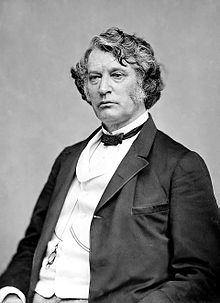
Back تشارلز سومنر Arabic تشارلز سومنر ARZ چارلز سامنر AZB Charles Sumner Danish Charles Sumner German Charles Sumner Spanish چارلز سامنر Persian Charles Sumner Finnish Charles Sumner French צ'ארלס סאמנר HE
This article's tone or style may not reflect the encyclopedic tone used on Wikipedia. (April 2023) |
Charles Sumner | |
|---|---|
 Portrait by Mathew Brady, c. 1865 | |
| Dean of the United States Senate | |
| In office March 4, 1869 – March 11, 1874 | |
| Preceded by | Benjamin Wade |
| Succeeded by | Zachariah Chandler |
| Chair of the Senate Foreign Relations Committee | |
| In office March 4, 1861 – March 4, 1871 | |
| Preceded by | James M. Mason |
| Succeeded by | Simon Cameron |
| United States Senator from Massachusetts | |
| In office April 25, 1851 – March 11, 1874 | |
| Preceded by | Robert Rantoul Jr. |
| Succeeded by | William B. Washburn |
| Personal details | |
| Born | January 6, 1811 Boston, Massachusetts, U.S. |
| Died | March 11, 1874 (aged 63) Washington, D.C., U.S. |
| Resting place | Mount Auburn Cemetery |
| Political party | Whig (1840–1848) Free Soil (1848–1854) Republican (1854–70) Liberal Republican (1870–1872) |
| Other political affiliations | Radical Republicans (1854–70) |
| Spouse |
Alice Hooper
(m. 1866; div. 1873) |
| Relatives | Sumner family |
| Education | Harvard University (AB, LLB) |
| Signature | |
Charles Sumner (January 6, 1811 – March 11, 1874) was an American lawyer, politician, and statesman who represented Massachusetts in the United States Senate from 1851 until his death in 1874. Before and during the American Civil War, he was a leading American advocate for the abolition of slavery. He chaired the Senate Foreign Relations Committee from 1861 to 1871, until he lost the position following a dispute with President Ulysses S. Grant over the attempted annexation of Santo Domingo. After breaking with Grant, he joined the Liberal Republican Party, spending his final two years in the Senate alienated from his party. Sumner had a controversial and divisive legacy for many years after his death, but in recent decades, his historical reputation has improved in recognition of his early support for racial equality.
Sumner began his political activism as a member of various anti-slavery groups, leading to his election to the U.S. Senate in 1851 as a member of the Free Soil Party; he soon became a founding member of the Republican Party. In the Senate, he devoted his efforts to opposing the "Slave Power,"[1] which in 1856 culminated in a vicious beating, almost to the point of death, by Representative Preston Brooks on the Senate floor.[2] Sumner's severe injuries and extended absence from the Senate made him a symbol of the anti-slavery cause. Though he did not return to the Senate until 1859, Massachusetts reelected him in 1857, leaving his empty desk as a reminder of the incident, which polarized the nation as the Civil War approached.
During the war, Sumner led the Radical Republican faction, which was critical of President Abraham Lincoln for being too moderate toward the South. As chair of the Foreign Relations Committee, Sumner worked to ensure that the United Kingdom and France did not intervene on behalf of the Confederate States. After the Union won the war and Lincoln was assassinated, Sumner and Thaddeus Stevens led congressional efforts to grant equal civil and voting rights to freedmen and to block ex-Confederates from power so they would not reverse the gains derived from the Union's victory in the war. President Andrew Johnson's persistent opposition to these efforts played a role in his impeachment in 1868.
During the Grant administration, Sumner fell out of favor with his party. He supported the annexation of Alaska but opposed Grant's proposal to annex Santo Domingo. After leading senators to defeat the Santo Domingo Treaty in 1870, Sumner denounced him in such terms that reconciliation was impossible, and Senate Republicans stripped him of his power. Sumner opposed Grant's 1872 reelection and supported Liberal Republican Horace Greeley. He died in office less than two years later.
- ^ Taylor 2001, p. 266.
- ^ Jones, David S.; Podolsky, Scott H.; Bannon Kerr, Meghan; Hammonds, Evelynn (December 7, 2023). "Slavery and the Journal — Reckoning with History and Complicity". New England Journal of Medicine. 389 (23): 2117–2123. doi:10.1056/NEJMp2307309. ISSN 0028-4793. PMID 38055250.
© MMXXIII Rich X Search. We shall prevail. All rights reserved. Rich X Search